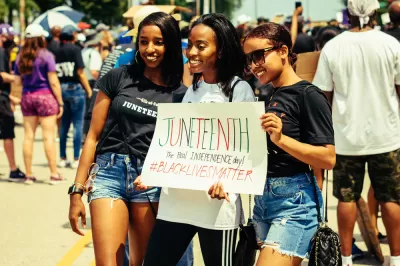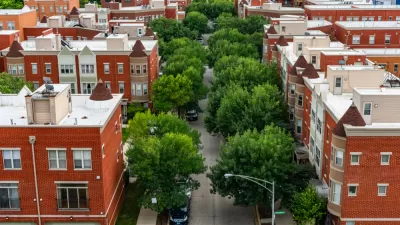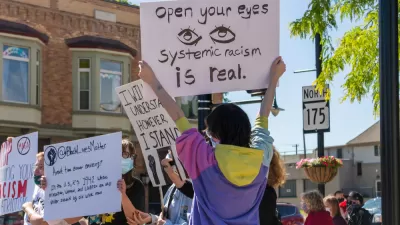On a holiday that commemorates the end of slavery in the United States, the White House marked the occasion by discussion exclusionary zoning.

In a remarkable moment that reveals how far the historical understanding of racism has come in recent years, an article on WhiteHouse.gov commemorates Juneteenth by examining the racial discrimination effect of exclusionary zoning.
Juneteenth, as explained in the article, marks the day a Major General of the Union Army arrived in Galveston, Texas to enforce the Emancipation Proclamation, and free the last enslaved Black people in Texas from bondage.
Given the historic significance of the date, and its increasing relevance as race continues to take central stage in the culture war, it might come as a surprise that zoning is on the mind of the Biden administration. The confrontation with the racism of the country in news media and politics at every level of government in recent years has include an account of the past discrimination and racism of planning policies.
While a nascent effort to undo some of the racist policies of the past is underway in some cities and states, much of which has focused on the exclusionary effects of single-family zoning, the idea zoning reform as a tool for equity is still relatively new in the halls of the federal government. The Biden administration has taken the cause of zoning reform to new levels of visibility by proposing a competitive grant program that would encourage cities to begin to dismantle the tools of exclusionary zoning. The Unlocking Possibilities Program would provide $5 billion in competitive grants as an incentivize for zoning reforms. (The Biden administration's Unlocking Possibilities Program closely follows the Housing Supply and Affordability Act proposed by Senator Amy Klobuchar (D-Minnesota), Senator Tim Kaine (D-Virginia), and Senator Rob Portman (R-Ohio) in March 2021.")
So, the White House Juneteenth article lays out the case for the program and for the movement.
"[I]t is imperative to not lose sight of the fact that we still have much work to do to address the vestiges of slavery and historic discrimination," reads the article. Exclusionary zoning, according to the article, is one of those policies and practices in existence today "that are seemingly non-discriminatory on their face but still negatively affect many families of color, especially Black families."
The article provides a history, full of links to research sources, about the evolution of exclusionary zoning as a tool of racism and discrimination.
FULL STORY: Exclusionary Zoning: Its Effect on Racial Discrimination in the Housing Market

Planetizen Federal Action Tracker
A weekly monitor of how Trump’s orders and actions are impacting planners and planning in America.

Congressman Proposes Bill to Rename DC Metro “Trump Train”
The Make Autorail Great Again Act would withhold federal funding to the system until the Washington Metropolitan Area Transit Authority (WMATA), rebrands as the Washington Metropolitan Authority for Greater Access (WMAGA).

The Simple Legislative Tool Transforming Vacant Downtowns
In California, Michigan and Georgia, an easy win is bringing dollars — and delight — back to city centers.

The States Losing Rural Delivery Rooms at an Alarming Pace
In some states, as few as 9% of rural hospitals still deliver babies. As a result, rising pre-term births, no adequate pre-term care and harrowing close calls are a growing reality.

The Small South Asian Republic Going all in on EVs
Thanks to one simple policy change less than five years ago, 65% of new cars in this Himalayan country are now electric.

DC Backpedals on Bike Lane Protection, Swaps Barriers for Paint
Citing aesthetic concerns, the city is removing the concrete barriers and flexposts that once separated Arizona Avenue cyclists from motor vehicles.
Urban Design for Planners 1: Software Tools
This six-course series explores essential urban design concepts using open source software and equips planners with the tools they need to participate fully in the urban design process.
Planning for Universal Design
Learn the tools for implementing Universal Design in planning regulations.
Smith Gee Studio
City of Charlotte
City of Camden Redevelopment Agency
City of Astoria
Transportation Research & Education Center (TREC) at Portland State University
US High Speed Rail Association
City of Camden Redevelopment Agency
Municipality of Princeton (NJ)





























